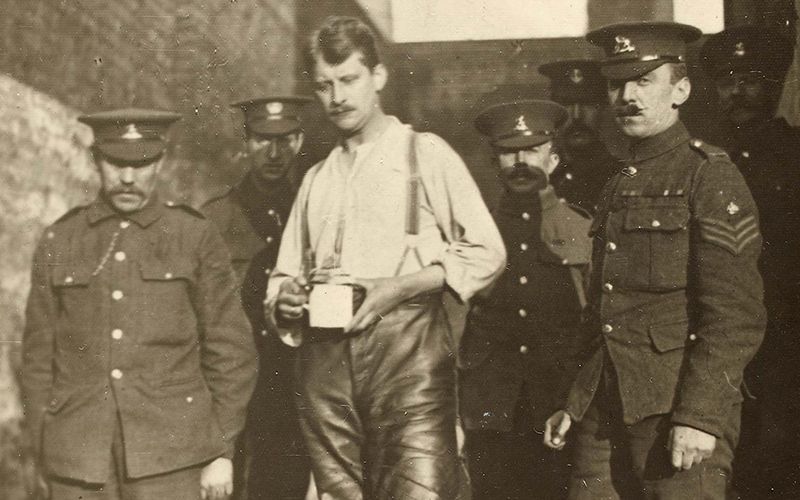| John Keating, Sean Gormley, Billy Carter, Dan Butler and Tessa Klein in 'The Weir.' |
Ireland wrong foots you. Its signposts lead in the wrong directions, its timetables are always notional, and its loquacious inhabitants actually tell you little about themselves.
To be Irish is to navigate contradictions. We’re Irish but we speak English, we’re European but we live on an island, we’re insular but we’re globetrotters, we’re individually retiring but collectively we’ll raise your roof.
We’re here, we’re ambiguous, get used to it.
The Irish, said Yeats, have a preference for a swift current. But that doesn’t imply an effective one.
In Ireland high speed Internet works most of the time, but not all of the time, and diverse locations produce diverse results. You’ll just have to get used to the unpredictability.
If you can’t get used to the unpredictability you’re not ready for Ireland. Other more prosaic cultures can find us exhausting.
Blow-ins notice the contradictions much more than the locals. The ring forts next to the ring roads and Cairns next to the Spars and the ruined castles that are becoming hotels often hypnotize them.
Ancient time and the 21st century exist side by side there like few places on earth. If you can live with the contradictions without blinking you’re on your way to becoming a local.
In Conor McPherson’s most accomplished play 'The Weir,' now playing at the Irish Repertory Theatre in New York, the writer examines the persistence of the supernatural in the burgeoning Celtic Tiger era, which is represented by Finbar (Sean Gormley) the local boy with the going concerns who has already bought up half his own village.
McPherson sets his play in a sterile world of lonely bachelors who break up the monotony and isolation of their daily lives by meeting up for a jar at their local far out in the country. Their nights are spent in teasing and rivalry and sometimes in blistering recriminations. But there’s clearly a rhythm to it they find reassuring, which is why they keep coming back.
Their world is shaken up by the arrival one evening of an attractive young woman named Valerie
(Tessa Klein). Introduced to the single lads by the married Finbar, who may be hoping to become more than just her tour guide, she’s a source of unexpected delight, and sometimes of resentment, that throws their evening off its usual groove.
Valerie, we learn, has come down from Dublin to rent old Maura Neelon’s place, a house that was built on a fairy road. What this means, I suppose, is that the real world has come into conflict with the psychic one, and when that happens hauntings can result.
Thanks to Valerie’s curiosity about her new home the lads tell her the story of the fairy road, which leads to a night of each of them telling ghost stories, describing real events that happened that they could not explain but have not forgotten.
As the evening goes on Jack (Dan Butler) emerges as the most fully drawn character. His rage as an older man recalls his callousness as a youth, when he missed the greatest romantic chance of his life out of sheer obstinacy. Butler gives us a much more antic performance that the signature one given by Jim Norton in the play’s original cast.
Jack is clearly in search of absolution, and it emerges that in her own way Valerie is too, and the author makes what happens to them as unsettling as the consequences. McPherson’s play takes increasingly disturbing turns as it amps up the terror that his characters experience.
In fact, the tales become increasingly distressing until Valerie, long silent, unexpectedly tells the most shocking one of all.
In tone and content, these tales – some of them are horrible – strain at edges of the play’s bucolic setting and introduce a shocking level of menace and upset, both for the characters and the audience.
Watching the play now, 16 years after its debut, it’s become common in some circles to hear it described as a classic.
It certainly qualifies as a meticulously observed and crafted tale, but the ghost stories told in The Weir are so distressing that they strain at the confines of the play. In fact, each character unloads so much growing psychic terror that the low-key conclusion, when it eventually arrives, looks a little unconvincing.
McPherson skillfully nudges us toward an encounter with the unseen world, but then he over eggs the horror. Not every ghost story need make your knees knock.
But the supernatural in 'The Weir' is experienced as increasingly hostile -- even the stillness and silence of the country is presented as a growing threat.
Taken individually, each ghost story delivers a riveting tale. But what it all amounts to is, even for the Irish, is just a little too ambiguous by the play’s end.
(The Weir is playing at the Irish Repertory Theatre until July 7. For tickets and showtimes visit www.irishrep.org).
Review by Irish Voice Arts Editor Cahir O'Doherty




Comments